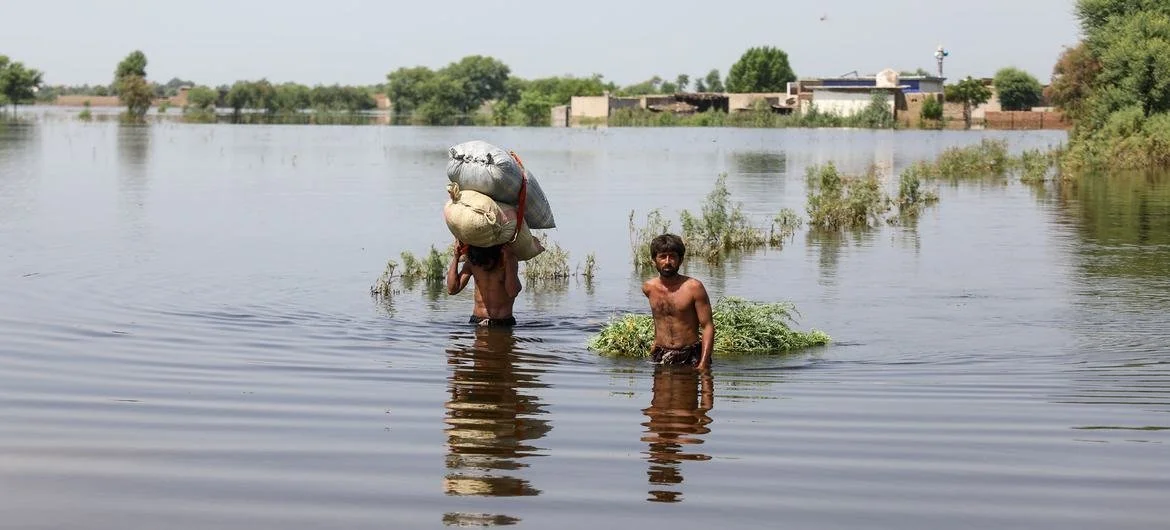Flash Floods are Wiping Out Villages in Pakistan— Scientists Link It to Climate Change
Table of Contents
The unprecedented heavy rains and catastrophic flash floods in Pakistan have left the country crippled with a severe emergency.
Impacting one in seven Pakistanis (over 33 million people), the devastating floods are wreaking havoc on a nation and its economy. In just a spur of roughly two months, millions have lost their homes and have been compelled to relocate. Some are even being forced to find housing on their own, owing to a shortage of shelter provisions.
According to Federal Minister of Climate Change, Sherry Rehman, Pakistan is currently submerged to the extent that it has surpassed all limits. The extent of the destruction in southern Pakistan has also left Antonio Guterres, UN Secretary-General, speechless. "I have seen many humanitarian disasters in the world, but I have never seen climate carnage on this scale," Guterres expressed in a press conference.
Source: United Nations
The rain has damaged over 150 bridges and 3,500 km of roadway. Per the preliminary official estimates, rebuilding and repairing will cost at least $10 billion, an unthinkable sum for the already burdened country. The top priority, however, is food and accommodation for the displaced millions.
As meteorologists predict more rain in the following weeks, the distress is airing strong feelings of wrongdoing throughout the nation. Despite producing less than 1% of global GHGs, Pakistan is particularly susceptible to climate change as a result of its geographic location. However, such violent rainfall has not occurred in Pakistan for years. The country's authorities are attributing the soaring downpours (along with the extremity of natural disasters worldwide) to climate change.
Climate Change Warning
According to experts, the terrible floods in Pakistan should serve as a warning to everyone about the dangers of climate change.
Climate impacts scientist Dr. Fahad Saeed told BBC news that this disastrous flooding would blindside even a wealthy country, "All of this is happening when the world has warmed by 1.2C - any more warming than that is a death sentence for many people in Pakistan."
Anja Katzenberger from the Potsdam Institute for Climate Impact Research also explains that scientists are expecting an increase in the average rainfall during the Indian summer monsoon season as a result of global warming. While the scientific link between intense downpour and climate change is rather simple (rising global warming leads to rising evaporation in water body temperatures which eventually results in heavier rain), Pakistan's massive glaciers (over 7000 known glaciers) are another factor making the country defenseless against the consequences of climate change.
According to the UN Development Programme, global warming is causing the glaciers in Pakistan's Gilgit-Baltistan and Khyber Pakhtunkhwa provinces to melt at a quicker pace, producing more than 3,000 lakes. And that, out of the 3000, 33 may explode without warning and discharge millions of cubic meters of water and debris, putting 7 million people in harm's way.
Impact On Crops & Farmers
The floods have ruined thousands of acres of land with standing crops ready for harvest. If the waterlogged farmlands are not dried out promptly, it is of fear that even the sowing of wheat (a staple crop of Pakistan) will not be impossible. The misfortune has, however, impacted small farmers whose survival depends on gathering crops and doing farm labor on small plots of land in villages the most. Local reports indicate that almost half of cotton cultivation is flooded in the main cotton-producing regions of Punjab, Sindh, and Balochistan, posing the risk of a significant decrease in cotton production across the country, supply pressure on the market, and price inflations.
So far, the country has lost about 1,400 lives to the ongoing crisis, aside from losing food supply and infrastructure in an area the size of the United Kingdom. The United Nations and Pakistan have announced an emergency fundraising appeal for $160 million to assist with the tragedy. The fund will offer food, water, sanitation, health, and other required assistance to around 5.2 million people.
While the flood-stricken nation awaits aid from around the world, U.S. Agency for International Development, Shahid Afridi's foundation, and International Medical Corps (among others) remain steadfast in their stand against the afflictions of Pakistan.

